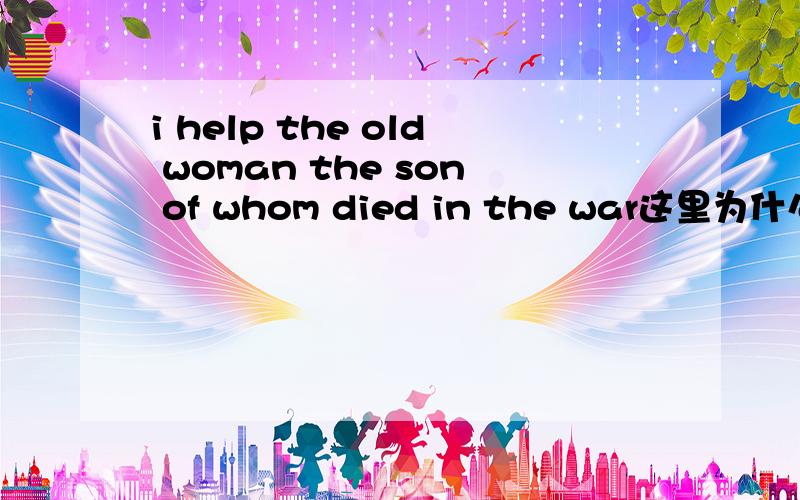i help the old woman the son of whom died in the war这里为什么用whom
来源:学生作业帮助网 编辑:作业帮 时间:2024/12/01 06:05:56

i help the old woman the son of whom died in the war这里为什么用whom
i help the old woman the son of whom died in the war
这里为什么用whom
i help the old woman the son of whom died in the war这里为什么用whom
正常或者规范的英语绝对不是这样表达的.更好的句子是:
I help the old woman WHOSE son died in the war.
the son of whom比不上whose son好.
可以说the son of whom这种结构在英语中已经不常用了.这种结构都是从德语,法语或者俄语借过来的.the son of whom == the son of the woman -------of后面的she就是 of whom -----因为of是介词,介词后面用宾格
she(主格)---her(宾格)
who(主格)--whom(宾格)
你好,同学,很高兴回答你的问题
正确答案:
因为在介词of 后面,所以用who的宾格形式,即whom
翻译:我帮助在战争中死去儿子的那个老女人。
这句话也可以用whose引导,即
I help the old woman whose son died in the war.
^...
全部展开
你好,同学,很高兴回答你的问题
正确答案:
因为在介词of 后面,所以用who的宾格形式,即whom
翻译:我帮助在战争中死去儿子的那个老女人。
这句话也可以用whose引导,即
I help the old woman whose son died in the war.
^^^^^^^^^^^^^^^^^^^^^^^^^^^^^^^^^^^^^^^^^^^^^^^^^
希望能帮到你,祝更上一层楼O(∩_∩)O
不明白请继续追问,可以详谈嘛(*^__^*)
^^^^^^^^^^^^^^^^^^^^^^^^^^^^^^^^^^^^^^^^^^^^^^^^^
收起
宾语从句
把定语died in the war 去掉,调整一下语序:I help the son of the old woman
这就得到了of whom 是修饰the son的,在介词of后面,必须用whom